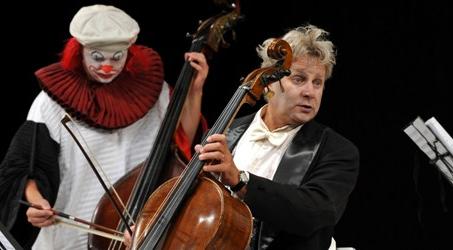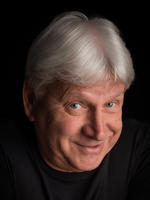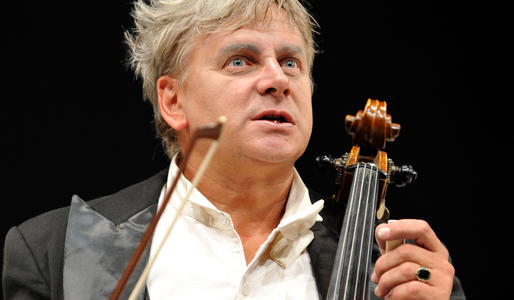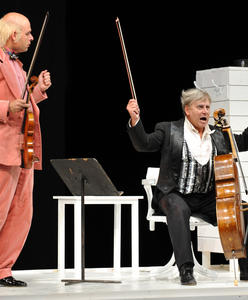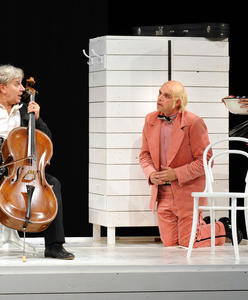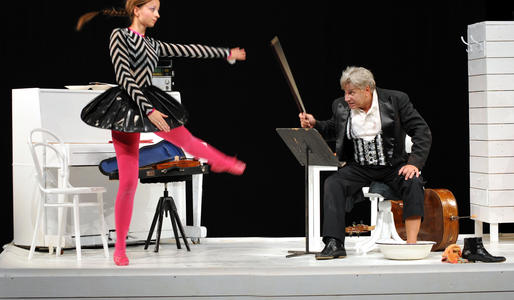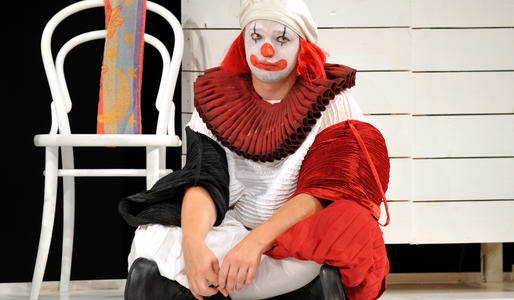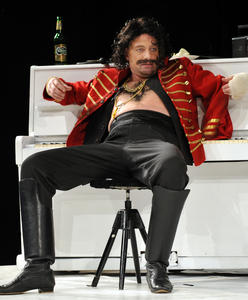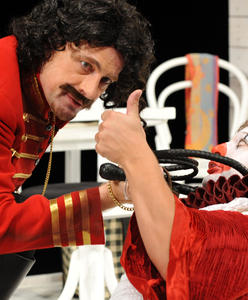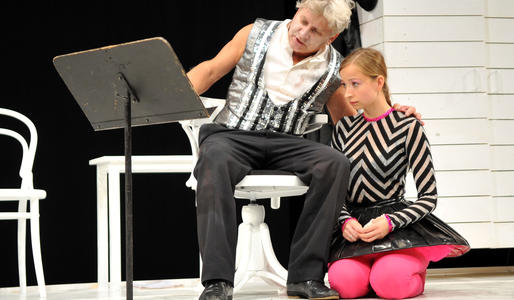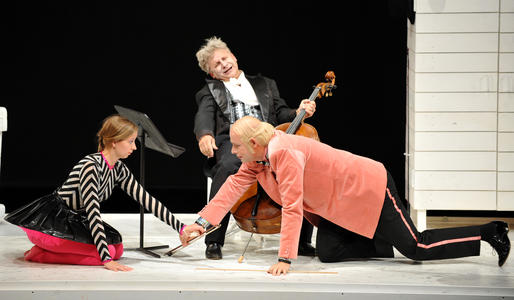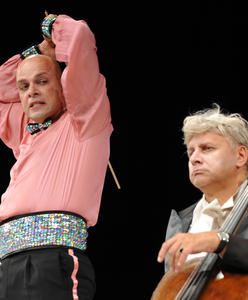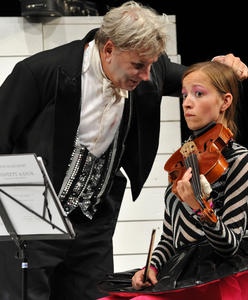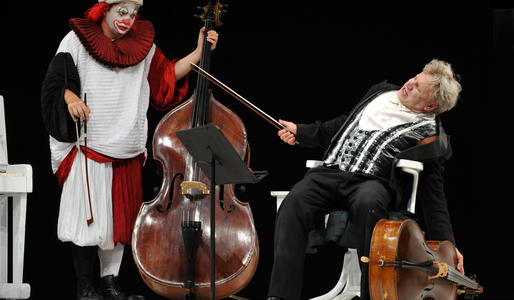A bizarre drama which is a demanding test of the producers as well as the spectators
Vít Závodský 1. December 2009 zdroj Kam supplement
The bizarre chamber original of The Force of Habit, which has a typically Bernhard-esque topic and an inventive structure as far as the form and language are concerned, was approached with considerate respect by the director of the Prague Theatre Divadlo v Dlouhé, Hana Burešová (her productions, highly praised by critics, regularly launch the theatrical season at Brno City Theatre). Burešová, dramaturgist Štěpán Otčenášek and artists Tomáš Rusín and Zuzana Štefunková avoided attempting any major changes to the translation by Josef Balvín, the specialist in German works who unfortunately died this summer.
The plot, which constantly appears to be treading water, is a variation on the author's favourite topic of a dominant "corrector of the world" who overloads his surroundings and imposes his obsessive concept on the people around him. In this case, it is the ageing director of a small circus, Caribaldi, who has been bothering the un-talented and disgusted members of his changing troupe with joint rehearsals of Schubert's famous Trout Quintet for what is now twenty-two years (!).
This more or less static situation, which varies only slightly during the long monologues, repetitions and strange dialogues, develops in spiralling circles. The involuntary, frustrated and hence absurd actors in this debacle are the servile Juggler acted by Viktor Skála, the Tamer, who is injured by his beast and likes drinking - acted by Igor Ondříček, Michal Isteník's Clown and the Artiste - the principal's Granddaughter, acted by Barbora Jelenová. The natural axis of the two-hour-long non-stop evening, which demanded the maximum of the spectators' concentration even during the gradated farce-like moments, is the exceptional performance by Jan Mazák (a nominee for the Alfréd Radok award for Deml's creation at the Theatre U stolu last year).
It is mainly via this character of a pedantic tyrant obsessed by his vision that the director demonstrates, within the playwright's intentions, not only the urgent topic of illness, old age and waste, but also the extreme contrast between deadening banality and the unfulfillable desire for the humble goal of absolute perfection or ambivalent reality, and also a stylized image of the deadly inability of people to mutually communicate in society. After seeing the demanding production The Force of Habit we have a lot to think about indeed.
A vain effort left traces
Zdeněk Hořínek 3. November 2009 zdroj Divadelní noviny
Thomas Bernhard is doing well in our climes. After Pitínský's productions of Ritter, Dene, Voss and The Showman, after Nvota's Heldenplatz, the next extraordinary event is Burešová’s production of The Force of Habit at Brno City Theatre.
The play is no less strange than most of Bernhard's pieces - for a period of two hours, we watch the embarrassing attempts of five comedians to learn Schubert's piano quintet in A major, The Trout. Bernhard's masterfulness lies, among other things, in that that the story doesn’t lose its impressive power despite all the stubborn repetition, probably due to the forceful rhythm of the textual melody. The connection of music and drama is a close one, even though it is conflicting and partially ironic. The individual characters are professional types as well as characters with typical and characteristic phraseology.
The beginning belongs to the Juggler, acted by Viktor Skála. All the components of the character are in perfect harmony: the costume (pink jacket and a shirt of the same colour) show a certain femininity, which the actor confirms with his oily and glib diction, snake-like movements and absent-minded gestures. He constantly wipes his bald head, as well as all of the, mostly dusty, objects of the white interior. His compulsive pedantry fully corresponds to his profession, which requires maximum exactness. Skála's great entry, which gained applause on the open stage during the premiere, isn't only an impressive moment - it also reveals the basic conflict in the situation, the unhappiness of the employees of the circus with the dictatorial Director and their vain effort to escape his manipulative will. For the Juggler, it is the illusion that he will leave his workplace and move to France - the land of his dreams.
In the case of the Tamer, Igor Ondříček, with a rich black wig (which, again, hides a bald head) and in an unbuttoned red shirt (which reveals his lazy hedonistic stomach), the resistance to the compulsory music training has an explicitly violent character. The aggressive savage expresses his hatred for the piano completely openly (he tried to destroy it with an axe and now sabotages it with his bandaged arm) and with his general rowdy behaviour, he expresses his anti-aesthetic attitude. He bites a large radish in a disgusting way, burps and throws pieces of meat at the Clown as if he were a tamed beast.
Michal Isteník, disguised as a clown, shows the masterful characteristics of a naïve clown using a tried-and-tested repertoire of clowning gags, somersaults and falls. His opposition to his boss is expressed only by the embarrassing, unintentional as well as intentional, and unbearably repeated falling of his hat. His big mouth is used mainly for the catching of food which is thrown to him; his textual participation is limited to fragmented refrains of the rhetorical utterances of the over-talkative Director.
Similarly and last, there is the most obedient member of the ensemble - the Granddaughter. The director has trained her to perform so well (with the significant help of Jiří Bilbo Redinger) that we mistake the young Barbora Jelenová for a trained ballet dancer. Via her mechanical leg movements she reminds one more of an obedient puppet than a living being; however, she shows a certain indifference or even dislike for the compulsory drill and Grandpa’s hugs by her occasional laughter and persistent digging in her nose.
Even Caribaldi, the larger-than-life director of the circus, tirelessly acted by Jan Mazák, isn't free of inner contradictions. At the beginning, we catch him in a humiliating position, lying down on his stomach and looking for the ever-disappearing rosin. With uncombed hair, in a worn jacket and dirty shirt-front, he remains defensive in the initial dialogue with the Juggler, but quickly pulls himself together and takes his position as ruler. In his endless monologues, he appeals, criticizes, complains, reminisces, laments and declaims. In contrast with sovereign rhetoric, the actor's face shows signs of absent-mindedness, irritability, tiredness and mainly of permanent suffering.
The more than twenty-year-long - and futile - effort to study Schubert's Trout Quintet has left some traces - the music enthusiast accepts in a moment of weakness that even he hates his instrument (the famous cello, or, in fact cellos on which he can play only a few non-coherent tones) and even the quintet which he has been dreaming of but which is beyond his capability. But what can be done: one has to play (as well as live), and if the talent for it is missing, then at least by the force of habit.
If the events on stage force the reviewer to write mainly about the acting performances this isn't merely by chance. The hidden but firm hand of the director can be seen not only in the complex and mostly ambivalent conception and inventive characters but also in the accurate organization of what is happening on stage, i.e. the process of alternating excitement and inhibition, gradation and degradation, a process which doesn't lose dramatic tension and doesn't stop being surprising even for a short while, despite the constant repetition.
This ruthless analysis of human attitudes and conduct in a situation of eternal, voluntary and involuntary striving for the impossible, the achievement of unachievable perfection, still contains a certain hint of hope and sense.
After a disharmonious furioso, a view of a starry sky appears accompanied by the almost perfect tones of Schubert's music.
We don't want life but life must be lived
Jiří P. Kříž 26. September 2009 zdroj Právo
Hana Burešová illuminates Bernhard's Force of Habit at Brno City Theatre
Thomas Bernhard's Force of Habit, directed by Hana Burešová, who is doing really well on this stage (personally, I have only found her Three Musketeers objectionable - together with a few other colleagues: Kerber, Uhde), is apparently less appealing to some spectators than they would like. Well, there isn't a single person in the world who is liked by everyone.
However, it isn't surprising. Brno was somewhat behind with the performing of plays by this great Austrian playwright, whose ideological dispute with his home country led to his prohibition of the performance of his texts there in his will. Perhaps this created an obstacle to the more sensitive understanding of the philosophy of this internationally-famous author.
To play Schubert’s quintet The TroutThe Force of Habit operates from the absurd connection of the micro world of a second-class circus, featuring stale artistic and animal-taming performances, with the world of high art.
The circus director and amateur violoncello player Caribaldi decides to force his staff to perform the musically perfect quintet The Trout by Schubert.
At the time of the play they have already been trying to achieve this in vain for twenty-two years.
Burešová is a master of interpretation, and she brings out the figurative meaning of Bernhard's play, the absurdity of which stems from the vicious circle of monotony in which the "artists" never get further than the tuning of their instruments and the production of what is usually a not very harmonic consonance. Their combined efforts reveal a spread of opinions on classical music, and also an effort to achieve the noble aim of an individual at the cost of psychological as well as physical terror…
Dedicated to BalvínJan Mazák's Caribaldi, who looks confused at first sight, is a perfect and lamentable example of how one may have the desire to create art yet the inability to do it. How many similarly great and criminally unnoticed roles has he played already?!
Burešová chose similarly skilled co-actors to accompany him: Viktor Skála (Juggler), Barbora Jelenová (Granddaughter), Igor Ondříček (Lion-tamer) and Michal Isteník (Clown).
The authors and Brno City Theatre dedicated the Czech premiere of The Force of Habit to Josef Balvín, Bernhard's court translator and the soul of the Prague German Language Theatre Festival. He died during this year's holidays (16th August), also unnoticed by the so-called respectable press.
Unusual Austrian play handled with respect in Brno
Luboš Mareček 22. September 2009 zdroj MF Dnes
This unusual and original dramatic work by Thomas Bernhard has made itself at home at Czech theatres over the past two decades. This man is probably the most famous writer of post-war Austria, and every newly-staged play from him is an eagerly expected event. This is exactly the case with the Czech premiere of The Force of Habit, produced by Hana Burešová at Brno City Theatre.
This title from the year 1974 isn't very welcoming for spectators, but that doesn't mean that it is abstract or hard to understand. The absence of a story, the strange monologicity, a fondness for the refrain-like repetition of the text completely without punctuation: these are only a few of the authorial finesses of a man who continuously stirred the waters of seemingly calm Austria both via his work and his life.
Funny, repulsive, likeable
The plot of the new production The Force of Habit is simple and bizarre. The circus director Caribaldi forces his employees to study Schubert's quintet The Trout for twenty-two years even though it is clear that these amateurs will never complete this beautiful piece of classical music. Even the stubborn Caribaldi only knows how to play a few tones on his two expensive cellos, his artists have no relationship to music and they hate the endless practicing. All their effort leads to nowhere, its futility is clear despite the director's noble desire to present a stunningly prepared quintet of musicians and a perfect composition, instead of stale circus jokes.
Bernhard's seemingly unfinished texts are a big test for both the directors and the acting ensemble. Hana Burešová's production team handled them well. The director constructed the two-hour-long show, with its slowly building inner tension and force, very carefully. In other words: the unusually undramatic plot can hold the spectators' attention and interest even without a break.
The Force of Habit is more than just an actor's production revolving around the powerful performance of Jan Mazák in the main role. The lead actor captured the character of Bernhard's world. He is funny, repulsive but also likeable in places due to his desire for perfection. Mazák presents this extremely demanding and long text with the loud ecstasy of a megalomaniac, carefully depicting crazy Caribaldi's inner world even without psychologising. The quartet of the remaining performances supports the actor and adds further quality to the evening, similarly as does the white stage by Tomáš Rusín and the colours and forms of the inventive costumes by Zuzana Štefunková.
A sad comedy about mental violence
Peter Stoličný 21. September 2009 zdroj www.divadlo.sk
There is one more premiere in Brno, and not of just any production. The work of the Austrian writer and dramaturgist, who was accompanied by scandals in his own country, isn't as distinct in the Czech theatrical environment as when it is shown in Vienna's Burgtheater. However, it is a production which cannot be overlooked.
Thomas Bernhard is considered to be a "Nestbeschmutzer'' (one who dirties his own nest) in his country. Particularly in the last ten years before his death (1989), he strongly criticized Austria, calling his own country a "Catholic National Socialist country of fools". Many people supported him, but he had even more enemies. It was as if he was looking for conflict and to offend Austrian celebrities.
But what is the core of Bernhard's genius and what are the reasons he is rejected? The genius is indisputable. His work is full of feelings of desolation and loneliness whilst among people, hopelessness and skepticism, all presented in brilliant monologues and dialogues which bear witness to his perfectionism. On the other side, the author uncompromisingly reveals human weaknesses, the omnipresent death which no one will escape, the utter pointlessness of human deeds and efforts. Perhaps it was his lung disease which didn't allow him to breathe properly from his childhood, or perhaps he acted as he did as a result of his experiences and suffering at school (frightening machinery) or in hospitals (waiting for death), but Bernhard's view of the world was certainly influenced by the voluntarily accepted doctrines of Hitler. His play Heldenplatz, which returns to the topic of the German invasion, probably caused the greatest scandal in Austria. The playwright's perfectly structured dialogues turn to the fundamental questions of existence and… to death, which will solve everything and is the final station. They are intriguing and provocative.
Bernhard's most frequently performed play in the Czech Republic is certainly The Showman (Martin Huba was unforgettable in the title role at the Theatre Na zábradlí, under the direction of J. A. Pitínský in 1999, if I'm not mistaken. He obtained the Alfréd Radok Award for this role). Bernhard's aversion to everything organised can also be felt from this successful play. He hates the spectators, views the actors with disdain, and writes the following about the institution of theatre itself: Theatre is only half-wittedness and smut, the pitifulness of helpless mimes. All theatres are kingdoms of dilettantism and nothing but stench can be smelled from the mouths of the bureaucrats.
It is a question as to what degree Bernhard was only a provocateur, and to what degree he was spitefully honest and full of hatred. However, one thing is certain. His novels and plays don't leave anyone calm. They excite with their realism in a world where everything is exaggerated, hyperbolic. If it weren't a phrase from the period of the building of socialist culture it could be said that the author shows a distorted mirror to contemporary society and… not only in Austria.
The Force of Habit is a play which isn't performed as often as e.g. The Showman, even though it isn't any less intriguing. It certainly provides space for the creation of excellent acting performances. That's why this Brno City Theatre production simply must be accepted.
The story is quite simple: It takes place in the office (or a caravan?) of circus director Caribaldi. More than twenty years ago, this man decided to perform Schubert’s quintet The Trout with his circus artists. But the juggler, lion-tamer, clown and the director's granddaughter don't have even the slightest talent. They practise the quintet only because they are forced to do so, and with hatred. Their hatred for Caribaldi and his obsession with practising this work of chamber music creates many very comic situations. The Force of Habit is about the desire for total perfection which contrasts with the banal and cheeky violence on show, the ruthless mental violation of the "employees". They cannot manage to revolt, and so succumb to this dictatorship like helpless sheep.
The main protagonist is, similarly as in the author's other plays, a dominant man. He humiliates, dictates, is tired and energetic at the same time; he is a ruthless egotist. The people around him are puppets, slavishly fulfilling his mad wishes. Nothing in their life is worth anything, nothing is of any importance and there is no hope that things could change.
I imagine that the master, Bernhard, had no idea how strange and perhaps different his play sounds in a post-communist country. That is: how it can be accepted by a generation which experienced a totalitarian regime at first hand. It is impossible to explain to today’s twentysomethings, even thirtysomethings, how things were back then. One has to experience this - no talking can take the place of being there. And we, who twenty years ago had already been adults for a long time, shiver when watching Bernhard's characters. This buffoonery, which we can laugh at in our own past - which is, luckily already gone - is so true to life. The cruel and laughable obsession of the dictator Caribaldi entertains us, despite the shivers which it evokes.
Director Hana Burešová deserves great credit for processing such a powerful text. As at Prague's Divadlo v Dlouhé theatre and on many other Czech theatre stages, she has shown herself to be an inventive creator, with a feeling for detail and for sensitively guiding actors on the edge of psychological drama and slapstick. However, she had mighty support from the actors. Certainly also thanks to the dramaturgist of the production, Jiří Záviš, the stage was filled with lively and rewarding characters.
Jan Mazák in the main role of the circus director surprised with his variety of register. He had already acted the charming Daphne in the musical Some Like It Hot, and on the other side of his acting scale, there is, for example, Peer Gynt. In the play The Force of Habit he showed his skill as a master of totalitarian practices. He wasn't just a figure (which would be tempting in this role) but a full-blooded character unhappy in his infinite egotism.
The servile juggler Viktor Skála, as well as Michal Isteník's sad "entertainer" clown, were beautiful studies of various forms of survival under totalitarianism. They didn't really live, they only survived, each in their own way.
The other two strong opposites were the characters of the lion-tamer (Igor Ondříček) and the delicate granddaughter of the circus director, Barbora Jelenová. (I hadn't seen her at Brno City Theatre before). Ondříček, a lion-tamer who should be able to crush anything with his strong fist (unfortunately, his hand was injured by a bird of prey), suppresses anger in himself and yet is not able to revolt. The granddaughter is a "girl controlled by a key", a person who blindly obeys orders. More a figure than a character - but this is probably the way it should be; this is how director Burešová wanted to have her.
The five actors on a functional white stage (stage by Tomáš Rusín) played their parts really well. Even though the spectators had several opportunities for a good laugh, the result of the play is chilling… Perhaps for those of us who lived through and survived the totalitarian culture, the experience was even more chilling than the author could imagine. Thanks to the period we experienced, thanks to the actors and thanks to the director who managed to stage this sad comedy in Brno City Theatre.

